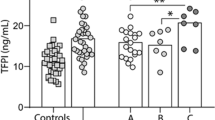Abstract
All-trans-retinoic acid (RA) is a potent differentiating agent that is very effective in the treatment of patients with acute promyelocytic leukemia (APL). Since clinical response can be accompanied by extramedullary manifestations, we have investigated the influence of RA on cell adhesion to and migration through reconstituted basement membranes (Matrigel) in the APL cell line NB4. No apparent cellular differentiation was observed during a 24-h incubation with 1 μM RA, as indicated by the nitroblue tetrazolium reduction test. However, exposure to RA significantly enhanced NB4 cell adhesion to Matrigel and consecutive migration through Matrigel barriers in a dose-dependent manner. Several integrin molecules potentially involved in this process, i.e., CD29, CD18, CD11a, CD11b and CD11c, were therefore studied by fluorescence-activated cell sorting analysis. The expression of the β subunit of the β2 integrins (CD18), but not that of β1 integrins (CD29), was increased during 24-h RA treatment. Among the β2 integrins, the expression of LFA-1 (CD11a) and of Mac-1 (CD11b), but not of p150,95 (CD11c), was induced by RA. When monoclonal antibodies that specifically block the interaction of these integrins with their ligands were used, we observed that CD29 is only involved in adhesion and CD11b only in migration, whereas CD11a participates in both processes. NB4 cells constitutively secreted the matrix metalloproteinases MMP-9 and MMP-2, which are known to promote cellular invasion processes by degradation of the extracellular matrix. RA treatment had no influence on the quantity of secreted MMP-9 or MMP-2 in these cells as determined by zymography. Addition of Batimastat (BB-94), a synthetic inhibitor of matrix metalloproteinases, blocked RA-induced cell migration without affecting cellular adhesion to Matrigel. These findings indicate that adhesion molecules as well as matrix metalloproteinases are involved in RA-stimulated migration of NB4 cells through Matrigel, possibly providing some explanation of tissue infiltration by leukemic cells as observed during treatment of APL patients with RA.
Similar content being viewed by others
Author information
Authors and Affiliations
Additional information
Received: 27 May 1999 / Accepted: 27 July 1999
Rights and permissions
About this article
Cite this article
Zang, C., Liu, H., Ries, C. et al. Enhanced migration of the acute promyelocytic leukemia cell line NB4 under in vitro conditions during short-term all-trans-retinoic acid treatment. J Cancer Res Clin Oncol 126, 33–40 (2000). https://doi.org/10.1007/PL00008462
Issue Date:
DOI: https://doi.org/10.1007/PL00008462




